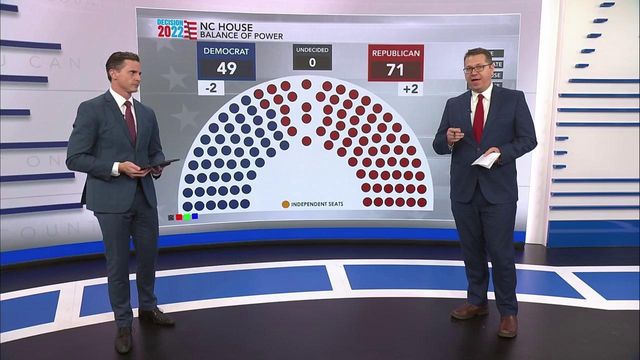NC Republicans win Senate supermajority, but fall just shy in House
North Carolina Republicans were hoping to gain a majority in both houses of the General Assembly that would be strong enough to thwart vetoes by Democratic Gov. Roy Cooper.
Posted — UpdatedNorth Carolina Senate Republicans won a 30-seat supermajority in the 50-member chamber, which would allow them to override Gov. Roy Cooper’s veto without any Democratic support. But Republicans fell one seat shy of a supermajority in the House after Tuesday's elections.
Incumbent Sen. Michael Lee delivered the 30th seat defeating Democratic challenger Marcia Morgan in state Senate District 7.
Republicans entered the night with 28 safe or likely victories, including flipping a seat held by Democrat Toby Fitch. Lee’s win, coupled with a victory by incumbent Sen. Bobby Hanig against Democrat Valerie Jordan in a northeastern North Carolina seat, pushed the Republicans to the magic number.
"This election has been a barometer for where voters want their state and country to go," said Senate Republican leader Phil Berger in a statement Tuesday night. "The Republican platform of low taxes, job creation, expanded parental choice, and quality education, is one that reflects the needs of all North Carolinians."
Cooper has vetoed more bills than any governor in North Carolina history since taking office in 2016 with Republicans in control of the state legislature.
However, since Republicans lost their supermajorities in both the House and Senate in the 2018 election, none of Cooper's vetoes have been overridden.
In the 120-member North Carolina House, Republicans need 72 seats to win a supermajority. They fell tantilizingly close, winning 71 seats.
Democratic wins by Terence Everitt in Wake County, Diamond Stanton-Williams in Cabarrus County and Laura Budd in Mecklenburg were pivotal wins on a night when Republicans knocked off six Democratic incumbents.
Even without a 72nd seat, Republicans could lean on conservative Democrats and take advantage of absences to help override vetoes.
All 170 state legislative seats were up during the election.
Cooper and state Democrats tried to see a positive in the Republicans' lack of a supermajority in the House.
"Our democracy thrives when we work together to enact common-sense solutions that better the lives of all North Carolinians," North Carolina Democratic Party chair Bobbie Richardson said in a statement. "North Carolina Democrats are committed to pursuing bipartisan solutions and advancing our policies to expand Medicaid, fully fund our public schools, and foster a stronger, more resilient economy.”
Supermajorities in both chambers would limit Cooper's influence during the final two years of his term.
"At that point, Roy Cooper isn't even a particularly effective speed bump for the Republican Party," said Chris Cooper, the director of the Public Policy Institute at Western Carolina University. "We have, by design, an extremely weak governor to begin with. There isn't much left except for a bully pulpit. There isn't much he can do."
During Cooper’s first two years in office, Republicans, equipped with supermajorities, overrode 23 of his 28 vetoes. But since Democrats broke the GOP supermajorities in the 2018 elections, none of Cooper’s 47 vetoes have been overridden.
Republicans, who have controlled both chambers of the state legislature since after the 2010 election, point to previous policy positions as a road map for where a supermajority would go next.
"I don't think you'll see necessarily any drastically new policy directions," said Pat Ryan, a Republican strategist who previously worked for Senate Majority Leader Phil Berger. "Sen. Berger has been consistent for a long time. He prioritizes cutting taxes as low as they can go, expanding school choice. Things we've heard for many years. I don't think there is some drastic sea change."
In the campaign, Democrats tried to make the case to voters that Republican supermajorities would push large changes to abortion rights, voting rights and public education.
"Hopefully this General Assembly will not pursue their worst impulses if that's the case," said Democratic strategist Morgan Jackson, who has worked with Cooper. "The governor's veto has been able to stop the culture wars from coming to North Carolina."
Republicans held 28 Senate seats and 69 House seats in the 2021-22 legislative session, meaning the GOP needed two additional Senate and three additional House seats to earn supermajorities. The districts were redrawn in December after the new Census, meaning the new districts do not correspond exactly with the old ones.
Republican and Democratic strategists, operatives and officials expected the fight for a GOP supermajority to come down to a handful of districts in both chambers, including races with Hanig and Lee.
Veto power
North Carolina was the last state in the nation to grant its governor veto power. The governor didn’t get veto authority until Jan. 1, 1997. Cooper’s three immediate predecessors combined for 35 vetoes. Sixteen of those were overridden. Cooper, working with a Republican-controlled legislature since being elected in November 2016, has vetoed 75 pieces of legislation.
Governor, Party, Years in office, Vetoes, Overrides
- Jim Hunt, Democratic, 1993-2001
- Vetoes: 0
- Overrides: 0
- Vetoes: 9
- Overrides: 1
- Vetoes: 20
- Overrides: 11
- Vetoes: 6
- Overrides: 4
- Vetoes: 75
- Overrides: 23
- Roy Cooper
- 2017-18 session
- Vetoes: 28
- Overrides: 23
- 2017-18 session
- Vetoes: 25
- Overrides: 0
- Vetoes: 22
- Overrides: 0
Related Topics
• Credits
Copyright 2024 by Capitol Broadcasting Company. All rights reserved. This material may not be published, broadcast, rewritten or redistributed.






